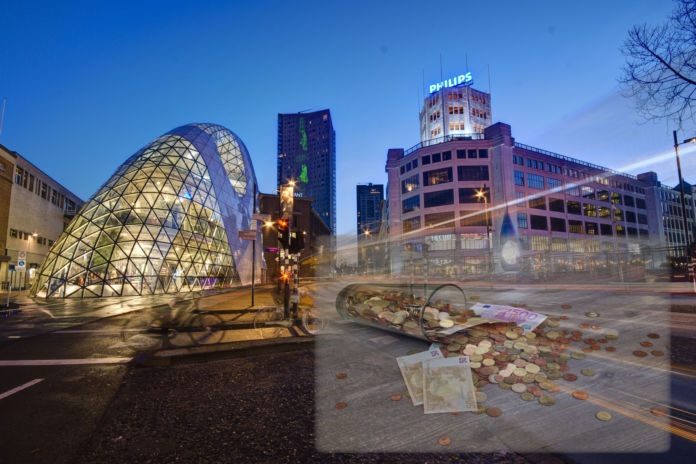For a majority of decisions we make in life, there’s always some direct or indirect cost involved. Money in modern times has become more than just a piece of paper, it is seen as a store of value, a unit of account and seemingly portable power.
This article is intended to provide factual information related to the cost of living in Eindhoven. This post gives the cost breakdown for students living in and around the Eindhoven region.
The cost of living primarily comprises of :
- Moving in costs – €300 to €600
- Accommodation – €260 to €700
- Groceries and consumables – €200 to €300
- Health Insurance – €20 to €40 (depends on an allowance)
- Transport – €20 to €40
- Leisure – €100 to the depth of your pockets
- Total ~ € 900 (average estimation)
Moving in costs
This consists of initial expenses required to kick start your day to day living after relocation. Generally, the studio apartments in the region come loaded with various amenities such as furniture, crockery and items needed for daily use. However, if one is lucky in finding a cheap and unfurnished place, the moving in costs could range from anything between €300 to €600 that could cater towards utensils, electrical appliances, and other miscellaneous items. Stichting Wereldhuis and De Grotste Bazaar offer a wide range of second-hand furniture and daily use goods at reasonable prices. In addition to this, there are stores such as Action and Ikea. If you are good at making friends, then you can also use the expertise of the artistic ones from Design academy or students from Industrial design in TU/e to beautify your shelter.
Accommodation
The Brainport region of North Brabant has been bustling with growth and expansion for the past few years now. The major influx of students in the region happens due to enrollments at Eindhoven University of Technology (TU/e – 12,000 students), Design Academy Eindhoven, and Fontys group of Schools. In addition to this, there is a constant flux of interns visiting for short term durations for projects at various companies such as Philips, NXP, ASML, DAF, TNO, VDL and several other companies in the region. The demand for housing has outgrown the supply and this has led to a steep increase in the rental prices in the city. The region has witnessed increasing rental prices on a YoY basis from 2014 onwards. Accommodation cost is a major monthly expense. It can vary from €250 for a small room to even €700 for a room near the center. There is also an option to live in independent studios aided by an allowance from the Dutch government to students if they meet certain conditions. It is generally applicable if one lives in a place with independent washroom and kitchen. More information regarding Huurtoeslaag (housing allowance) can be found here.
Groceries and consumables
Besides the rent, the second biggest chunk of expenditure goes towards the cost of groceries, daily goods and consumables. This category varies according to personal preferences and can amount to €200 to €300 per month. Popular supermarkets that offer various products are Jumbo, Aldi, Spar, Albert Heijn and LIDL. Personally, I feel LIDL is pocket-friendly without compromise on quality. In addition to this, there are various Turkish stores in the city where one can find all kinds of fresh vegetables, spices and condiments at a fair price.
Health Insurance
Health insurance is mandatory in the Netherlands. The most popular one with International (Non-European) students is the ICS Complete provided by AON, that costs €40 euros per month. Moreover, there is scope to save some geld for working students. If you are working, it is needed to have regular health insurance, the premium for which varies from €85 to €115 depending on the insurance provider. However, if the annual income is below a certain amount, one is eligible for Zorgtoeslag or healthcare allowance, and that can be calculated here.
Transport
The Netherlands is extensively bike-friendly and so is Eindhoven. A bike (fiets) is the most common means of commute amongst students, this makes transportation almost free and healthy at the same time. A decent, basic bike could cost anywhere between €50 to €200. It is highly recommended to invest in a good lock to save yourself from frustration. You can insure your expensive electric bike as well. Swapfiets also offers subscription service for simple bikes starting at 12 euros per month for students. Biking to other cities could be a bit unrealistic in Dutch weather. Public transport, though expensive is one of the best in the world. OV-chipkaart is essential for using public transport and various offers and discounts are always available.
Leisure
Eating out and entertainment is certainly part of student life. A good three-course meal in a restaurant can cost you somewhere between 20 to 30 bucks, one can also check out Groupon and Social deal for good deals from time to time. The city also has its share of eateries that are easy on the pocket.
For a drink or a night out at a pub, there are plenty of options to choose from at Stratumseind. There is also a student-friendly cafe at the TU/e campus – Hubble where one can get tap beers at a discounted price, and on Wednesdays Stadsbrouwerij also offers a discount on tap beers to students. Strijp-S is also a hip locality in the city, with amazing cafes and eateries.
For the movies buffs, Tuesday’s at VUe are worth checking out. Natlab, Lab-1 are some of the other options as well.
For sports enthusiasts, TU/e Student sportscentrum offers a wide selection of activities at fairly discounted rates.
This post gives an overview of the cost of living in this innovative and technological southern Dutch city.
Good luck with your relocation!
For Eindhoven News: Kanishk Mishra











